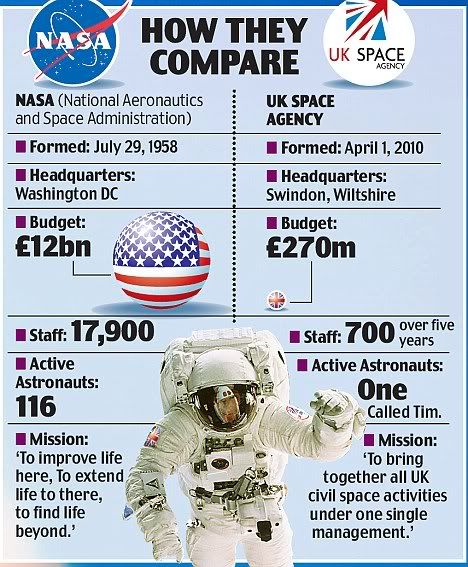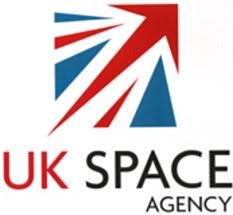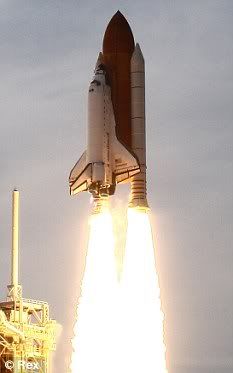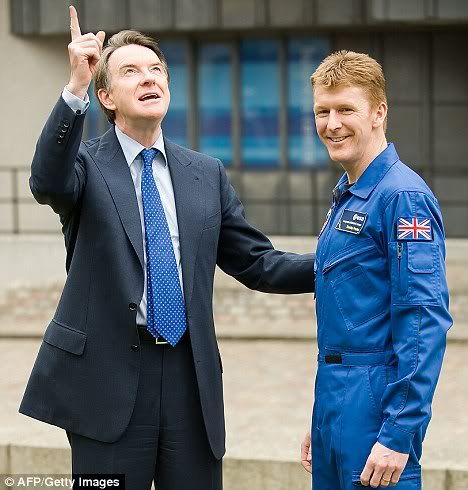Yesterday, the Wiltshire town known for its steam railway museum was named as the home of the nation's first space agency.
Ministers say the UK Space Agency, which launches on April 1, will guarantee Britain's place among the stars and inspire a generation of children to become astronauts.
Nasa, however, is unlikely to be too concerned at the threat.
UKSA will have an annual budget of £270million, or just one 50th the size of the American agency's, just one astronaut called Tim and a Union Flag logo that resembles the titles to Dad's Army.
Its creation brings together the budgets and work of a host of government departments and funding councils under one roof, and replaces the British National Space Centre.
Rather than launch its own missions, UKSA will promote Britain's interests in the European Space Agency.Most of its work will involve Earth observation satellites, planetary probes and telecommunications.
It will also help co- ordinate space science research in universities.
The announcement - which followed months of speculation about the agency's name - was welcomed by scientists and business leaders.
At one point Lord Drayson, the minister for science and innovation, had hoped to call the body Her Majesty's Space Agency.
Yesterday, he said the creation of UKSA was crucial to promoting Britain's growing space industry.
'The action we're taking shows that we're really serious about space,' he said.
'The UK Space Agency will give the sector the muscle it needs to fulfil its ambition.'
The agency was launched in London yesterday with the help of British astronaut Major Tim Peake, who is training in Russia to be a European Space Agency astronaut.
Although the UK has long been a member of ESA, this is the first time it will have a fully fledged space agency.
Germany, France and Italy all have national space agencies.
Lord Mandelson, the Business Secretary, stressed the role of the agency in Britain's satellite, robotics and telecoms industries.
'I think it is important to remember that although it is cutting edge, this stuff is not sci-fi,' said Lord Mandelson.
'It may start in space, but it comes down to Earth very quickly and is directly relevant to all our daily lives.'
The recession- defying space industry already contributes around £6billion a year to the economy and supports 68,000 jobs directly and indirectly.
Over the next 20 years it has the potential to grow to a £40billion industry and create 100,000 jobs, ministers believe.
Major Peake, a test pilot in the Army Air Corps, had the job of starting a countdown to unveiling the space agency's logo, displayed on a large screen at the Queen Elizabeth II conference centre.
The logo is a £10,000 design, based on the Union Flag, that shows a |red arrow aiming for the skies.


Logo: The nation's first space agency has been unveiled

Lift off: One of NASA's space shuttle missions
Major Peake is undergoing trainingin Russia before flying on missions to the International Space Centre.
He was one of six Astronaut Corps recruits chosen by the European Space Agency last year and is Britain's first 'home grown' astronaut.
He described the establishment of the UK Space Agency as 'a very positive move'.
'I think it recognises the huge success story that the British space industry has been and sets the scene for us to take that success-into the future,' he said.
'Britain has an enormous amount of talent in areas such as telecommunications and robots.
'It's extremely important that we do try to encourage our younger generations to take up these sorts of careers, and today goes a long way towards achieving this.'
Swindon is no stranger to firsts. In Victorian times it had the world's first recorded railway refreshments room and Britain's first lending library.

Reach for the skies: Lord Mandelson and British astronaut Timothy Peake attended the London launch
KEY MOMENTS IN BRITISH SPACE EXPLORATION
* Britain's global space science contributes £6.5billion a year to the UK economy and supports 68,000 jobs
* The new agency will replace the soon to be defunct British National Space Centre (BNSC). It was established in 1985 to co-ordinate space policy and programmes
* Britain excels in developing small satellites and in robotic space exploration.
* Beagle 2, the first UK-developed, built and tested craft to be sent into space was due to land on Mars in December 2003 to look for signs of life. It was released from the European Space Agency spacecraft Mars Express and began its descent onto the surface. However it failed to communicate and has not been heard from to the disappointment of British scientists.
* The first British-built Galileo satellite, Giove-A was successfully launched from the Baikonur Cosmodrome in Kazakhstan on December 28, 2005.
* A handful of Britons have flown on the US space shuttle, but there have been no 'home grown' UK manned space missions.
* The first Briton in space was Sheffield-born chemistry graduate Helen Sharman in May 1991. She beat off competition from 13,000 hopefuls to take part in the Soviet mission Project Juno spending eight days conducting scientific experiments at the Mir Space Station.











